Thank you so much for your generous support over the last six months which has furthered contributed to the protection and conservation of Critically Endangered orangutans, tigers and elephants.
Antak and Hercules find their freedom
You may recall our campaign last year to release the ‘BORA Six’ - Nigel, Antak, Hercules, Ucokwati, Mungil and Memo - into the Busang Ecosystem in East Kalimantan. In my last update back in August 2022, I reported that Antak and Hercules had been moved to the Bawan (pre-release) Island, following Nigel’s successful release, to prepare them for their final journey to freedom. I am now pleased to report that Antak and Hercules have finally joined Nigel, Ucokwati and Mungil in their forever home within the Busang Ecosystem with their release taking place in October 2022.
Sedating and moving an adult male orangutan is a complex and potentially dangerous procedure. The team at BORA worked diligently and quickly to ensure both adult males were transferred safely. Antak entered the water after being darted so the team had to be extra vigilant to keep him safe whilst also manoeuvring him into the transport crate.
All orangutans are doing well after their release including foraging for wild food sources. They will be monitored by BORA staff for some time to ensure they are adapting to their new surroundings.
Memo is the last of the ‘BORA Six’ to be released. She is currently awaiting her release onto the Dalwood-Wylie (pre-release) Island, which is expected to be undertaken in the next few months.
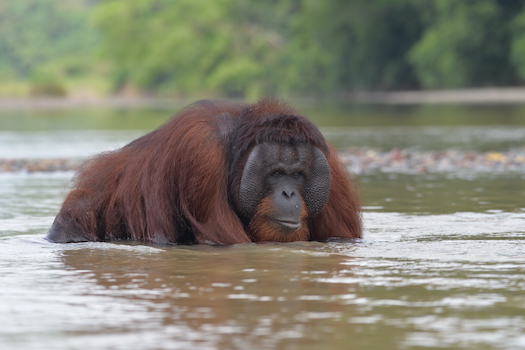
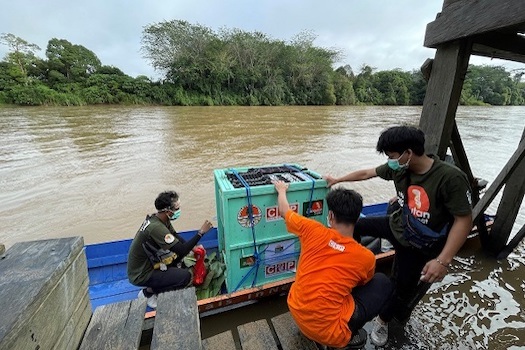
(Left) Antak enters the water after being sedated (Right) Antak is placed on boat to be transferred to release site
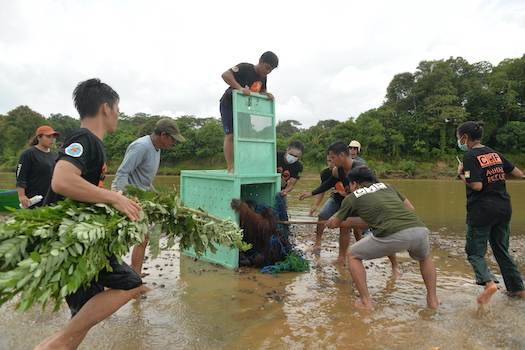
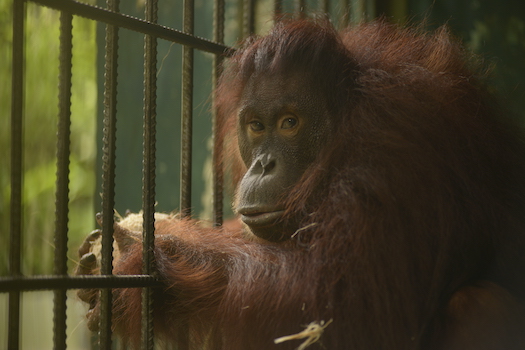
Left: Hercules is gently coaxed into his transport crate Right: Memo waits patiently for her final release back to the wild
The release of orangutans from our BORA Rescue Centre back into the wild gives hope that we can revert the impending extinction crisis, but we cannot do it alone. We need more individuals to join us to secure and protect viable rainforest habitat like the Busang Ecosystem to ensure the future survival of Critically Endangered orangutans.
Loveable orangutan rescued
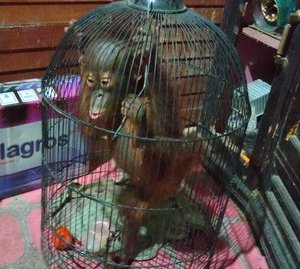 In late November 2022, an infant female orangutan was rescued from horrific conditions by the local conservation agency in East Kalimantan. It’s suspected that her mother had been shot dead in an oil palm plantation. The baby was being kept in a small bird cage and was found curled up in pain.
In late November 2022, an infant female orangutan was rescued from horrific conditions by the local conservation agency in East Kalimantan. It’s suspected that her mother had been shot dead in an oil palm plantation. The baby was being kept in a small bird cage and was found curled up in pain.
Our BORA rescue team was immediately dispatched to pick up the tiny and sick infant. She was estimated to be approximately 11 months old from her dental examination, however was only the size of a four-month-old due to being malnourished and sick.
The infant orangutan was named ‘Mabel’ meaning loveable. Our BORA veterinary staff provided immediate intensive care to Mabel which included assisting her with her breathing since she was congested.
Over the last two months, Mabel’s health has improved, and she is eating a variety of food. Rambutans and sunflower seeds are her favourites. She has visited the baby playground and forest area to practise her climbing skills.
Mabel currently only weighs 3.5kgs. Once her strength has increased and she has been cleared from quarantine then the staff at BORA plan to introduce her to an older female named Septi who has previously shown affection to other young orangutans. Having an older orangutan to bond with will provide Mabel with the much needed emotional support she needs following her traumatic start to life.
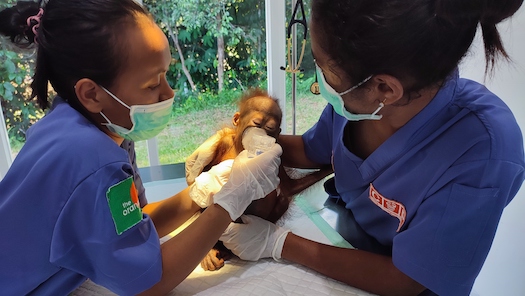
Left: Mabel receiving medical assistance to help clear her airways from congestion; Right: Mabel eating rambutan fruit whilst enjoying some morning sun.
New BORA Rescue Centre welcomes new arrivals
Construction of our new BORA Rescue and Rehabilitation Centre was completed in August 2022. Located on 2.5 hectares near Berau in East Kalimantan, the new facility includes an orangutan clinic, quarantine and socialisations cages, a food warehouse, warehouse and sterile room for staff and an office.
The 23 orangutans being cared for at the existing BORA Centre are currently in the process of being transferred across to their new home. Three orangutans have so far made the move; Septi, Eboni and Pingpong. They have been joined by our newest rescue Mabel.
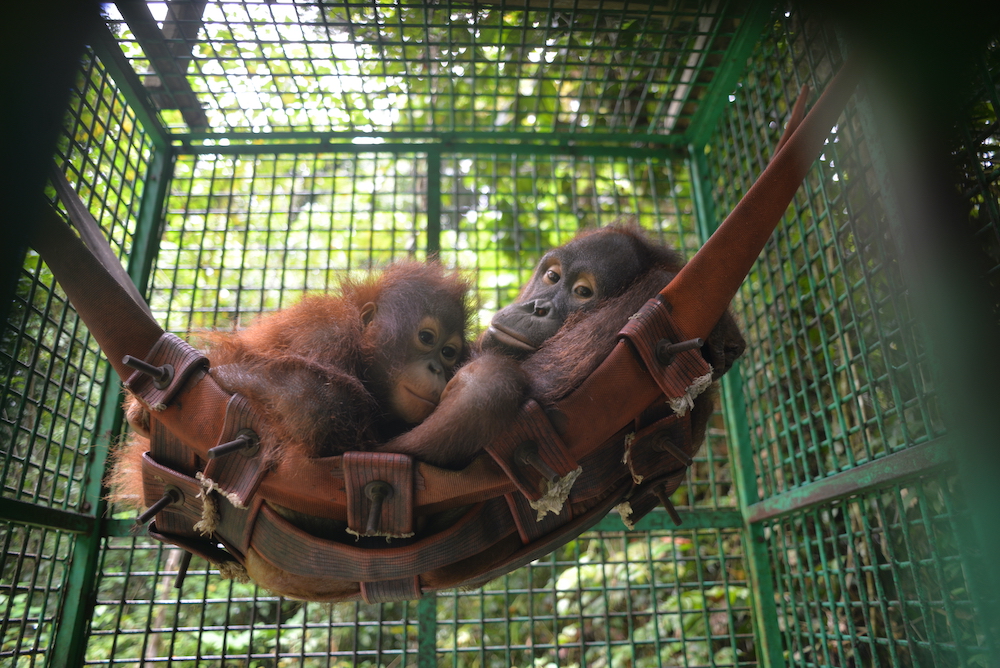
Septi (right) has become a mother-figure for three-year-old Eboni who was rescued in April last year
We currently have the opportunity to purchase an additional three hectares of land adjoining the new BORA centre which is to be used as a Jungle School area and to provide for a permanent forested enclosure for adult orangutans that cannot be released to the wild. Currently there are two adult male orangutans - Ambon and Pingpong - who are unable to be released. Both are approximately 20 years of age. As they were both admitted to BORA as adolescents, having spent many years in captivity, they were too old to be included in the Jungle School program, therefore were unable to learn the valuable skills needed to survive in the wild on their own.
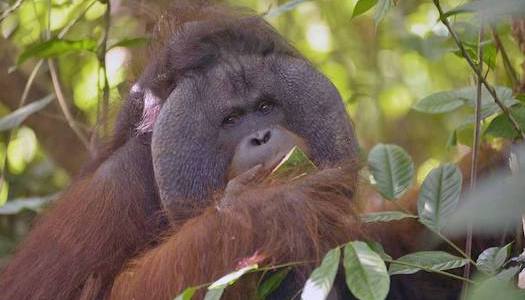
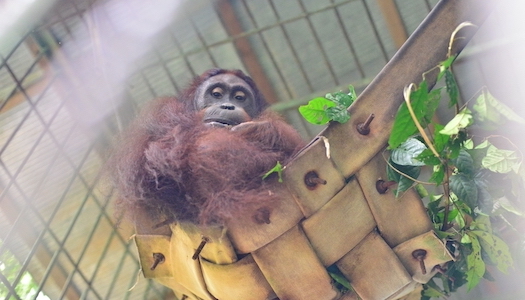
A permanent forested enclosure will give Ambon (left) and Pingpong (right) the chance to live outside the cage
Our plans are to build a large forested enclosure which will give orangutans like Ambon and Pingpong the chance to live outside the cage and significantly improve their quality of life.
We need to secure $36,500 to secure this land for our forest school and orangutan rehabilitation program. If you are interested in contributing towards this project please email erryn.stephens@orangutan.org.au who can send through a funding proposal.
Meet the Power of Mama Firefighting team
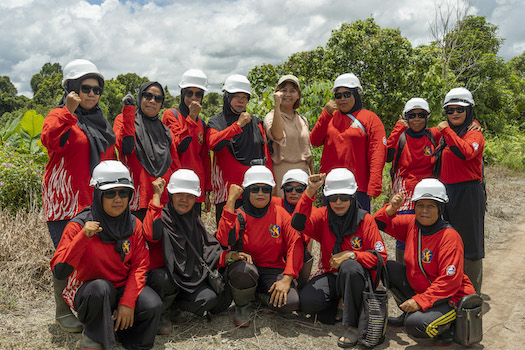 The long-term goal of Yayasan International Animal Rescue Indonesia (YIARI) is to establish and maintain self-sustaining orangutan populations in the wild, by taking a holistic approach to protecting wild populations and their habitats. In 2022, YIARI established a number of female-led forest fire prevention and firefighting teams in key areas in West Kalimantan. Collectively, they are called ‘The Power of Mama’.
The long-term goal of Yayasan International Animal Rescue Indonesia (YIARI) is to establish and maintain self-sustaining orangutan populations in the wild, by taking a holistic approach to protecting wild populations and their habitats. In 2022, YIARI established a number of female-led forest fire prevention and firefighting teams in key areas in West Kalimantan. Collectively, they are called ‘The Power of Mama’.
The Orangutan Project is proud to have provided key funding so this project could be launched. As champions of wildlife conservation, role models, educators and beacons of hope, the female-led teams will not only transform attitudes towards the role of women, but they will also highlight the capabilities and success of females in traditionally male roles.
Outcomes of this project are to
- restore peatlands to their natural waterlogged condition, reducing Karhutla (forest fire) events;
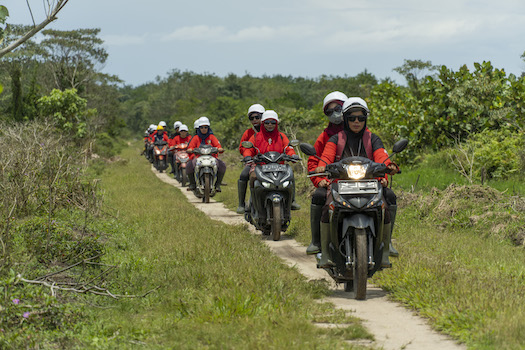 increase the health and wellbeing of forest-edge communities;
increase the health and wellbeing of forest-edge communities;- safeguard orangutans by eliminating fire risks in vulnerable forests;
- protect wildlife, empower women, and uplift forest-edge communities;
- increase forest-edge communities’ awareness about the protection status of orangutans and the importance of their conservation and protection of forest habitats; and
- increase the education level of local communities, especially of youth and women, to promote critical thinking, additional development opportunities, and environmental consciousness.
The current Power of Mamas are super enthusiastic and are doing amazing things in their respective villages and forested/ agricultural areas. They have far exceeded our expectations in just a few months of running. There are more women eagerly sitting on the side-line waiting to become Power of Mama's.
Wildlife Ambulance in Sumatra
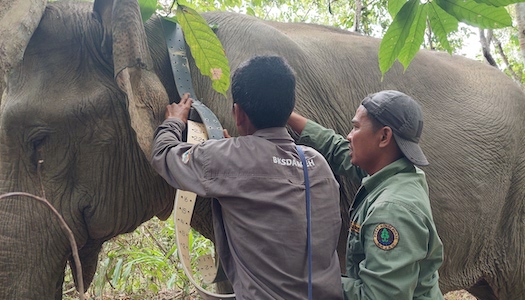 The International Elephant Project provides critical funding for the Wildlife Ambulance in Sumatra. The ambulance veterinary team support numerous wildlife conservation and welfare programs that require qualified wildlife veterinary expertise including wildlife rescues, confiscations from illegal trade, translocations, GPS-collaring for monitoring and conflict mitigation, wildlife disease surveillance and prevention, management of wildlife in captive situations such as in sanctuaries, rehabilitation centres, zoos for captive breeding and education programs.
The International Elephant Project provides critical funding for the Wildlife Ambulance in Sumatra. The ambulance veterinary team support numerous wildlife conservation and welfare programs that require qualified wildlife veterinary expertise including wildlife rescues, confiscations from illegal trade, translocations, GPS-collaring for monitoring and conflict mitigation, wildlife disease surveillance and prevention, management of wildlife in captive situations such as in sanctuaries, rehabilitation centres, zoos for captive breeding and education programs.
In August 2022, the Wildlife Ambulance provided veterinary expertise, equipment, medical supplies, and drugs for a wild elephant GPS collaring operation in Aceh Pidie regency. Collaring specific elephants in herds allows them to be closely monitored and followed if necessary. This provides elephant herds with protection and assists with human-elephant conflict mitigation.
An adult female elephant was sedated via a dart gun on 4 August. From the body measurements taken from the elephant, she was calculated to have a body weight of about 2,600 kg. The GPS collar was fitted when the elephant was in a deep standing sedation. Antiseptic and antibiotic treatment of the dart wound was applied as well as administration of long-acting antibiotics to minimise the risk of wound infection, abscess, and tetanus.
West Sumatra Tiger Patrol Team
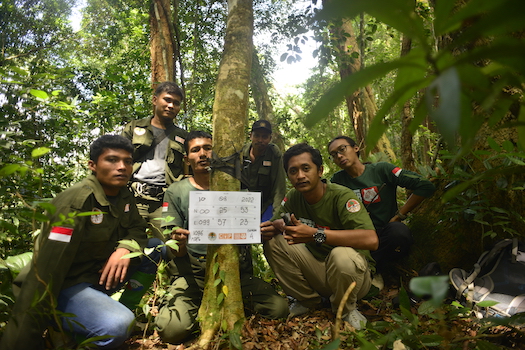 In February 2022, the International Tiger Project, in cooperation with the Ministry of Environment and Forestry and the Centre for Orangutan Protection, established a new Tiger Patrol team in West Sumatra. The team currently consists of a captain, one field assistant and five rangers.
In February 2022, the International Tiger Project, in cooperation with the Ministry of Environment and Forestry and the Centre for Orangutan Protection, established a new Tiger Patrol team in West Sumatra. The team currently consists of a captain, one field assistant and five rangers.
The mission of this team is to provide crucial protection for a population of approximately 70 Critically Endangered Sumatran tigers that call the region of West Sumatra home. Specifically an area known as Sontang Forest, which is close to Sontang Village in the Pasaman District of West Sumatra. This village borders the Pasaman Protected Forest which is an important habitat for the Sumatran tiger.
The team is tasked with undertaking regular wildlife patrols, installing and reviewing footage from camera traps to document illegal activities and to track tiger paths. The team has set up multiple camera traps on the tiger trails inside Sontang forest. The installation of camera traps aims to record animal biodiversity including Sumatran tigers in Sontang Cubadak forest.
Another important aspect of their work is to undertake community education with local school children to educate them on the importance of tiger conservation. In August and September of last year the team visited local Elementary Schools in the Songtang region where they spoke about the importance of conservation, the role of the forest and the animals living within, and that they should contact the local authorities or the Tiger Team if any wildlife is entered in their village. The students were very excited to learn about wildlife through pictures, videos, and a quiz.
